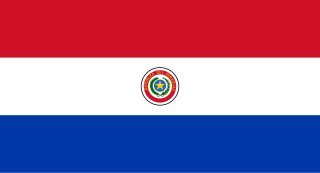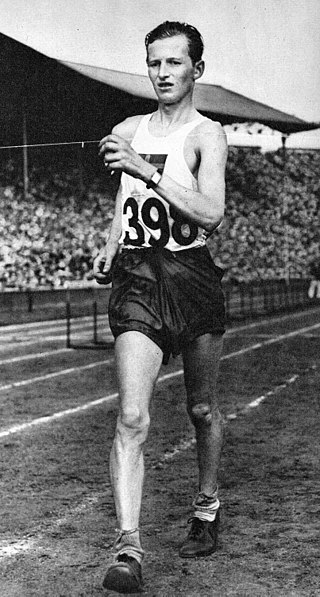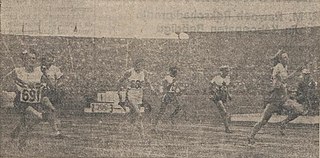
Paraguay competed at the 2000 Summer Olympics in Sydney, Australia.

Iceland competed at the 1948 Summer Olympics in London, England. The country was represented by 1 man in Art competitions, 11 men in athletics and 5 men and 3 women in swimming.

The men's 5000 metres event at the 1948 Olympic Games took place July 31 and August 2. The final was won by Gaston Reiff of Belgium. The Belgian Gaston Reiff became the Olympic champion ahead of the Czechoslovakian Emil Zátopek. Willem Slijkhuis from the Netherlands won bronze.
The men's 10,000 metres event at the 1948 Olympic Games took place July 30. The final was won by Emil Zátopek of Czechoslovakia.
The men's 4 × 400 metres relay event at the 1948 Olympic Games took place on 6 and 7 August. The United States team won the final with a time of 3:10.4.

The men's 10 kilometres walk event at the 1948 Summer Olympic Games took place from 3 to 7 August. The final was won by Swede John Mikaelsson. This was the first time since 1924 the event took place.

The men's 50 kilometres walk event at the 1948 Summer Olympic Games took place July 31. The final was won by Swede John Ljunggren.

The men's shot put event was part of the track and field athletics programme at the 1948 Summer Olympics. Twenty-four athletes from 15 nations competed. The maximum number of athletes per nation had been set at 3 since the 1930 Olympic Congress. The competition was held on 3 August. The final was won by American Wilbur Thompson. Thompson's compatriots, Jim Delaney and Jim Fuchs took 2nd and 3rd place. It was the ninth time that an American had won the event, and the fifth time that the Americans had swept the medals.

The men's discus throw event was part of the track and field athletics programme at the 1948 Summer Olympics. Twenty-eight athletes from 18 nations competed. The maximum number of athletes per nation had been set at 3 since the 1930 Olympic Congress. The competition was held on August 2. The final was won by Adolfo Consolini of Italy. It was the nation's first victory in the men's discus throw; Italy had previously taken bronze in 1936. Giuseppe Tosi earned silver to put Italy in the top two places. Fortune Gordien of the United States won bronze, keeping the Americans on the podium in each appearance of the men's discus throw to date.
The men's javelin throw event was part of the track and field athletics programme at the 1948 Summer Olympics. The competition was held on August 4. The final was won by Tapio Rautavaara from Finland.

The men's hammer throw event was part of the track and field athletics programme at the 1948 Summer Olympics. The competition was held on July 31. There were 24 competitors from 17 nations. The maximum number of athletes per nation had been set at 3 since the 1930 Olympic Congress. The final was won by Imre Németh of Hungary. It was the nation's first medal in the men's hammer throw. Ivan Gubijan of Yugoslavia took silver; that nation also earned its first medal in the event. Robert Bennett of the United States received the bronze medal, returning the American team to the podium after a one-Games absence.

The men's decathlon event at the 1948 Olympic Games took place between August 5 and August 6. The 17-year-old Bob Mathias of the United States won with a points total of 7139.

The women's 100 metres sprint event at the 1948 Olympic Games took place July 31 and August 2. The final was won by Dutchwoman Fanny Blankers-Koen.
The women's 200 metres sprint event at the 1948 Olympic Games took place on August 5 and August 6. The final was won by Dutch athlete Fanny Blankers-Koen. It was the first time this event was included in the Summer Olympics.
The women's 80 metres hurdles event at the 1948 Summer Olympic Games took place on 3 and 4 August. The final was won by Dutch athlete Fanny Blankers-Koen.
The women's 4 × 100 metres relay event at the 1948 Olympic Games took place on August 7. The Dutch team won with a time of 47.5.
The women's long jump event was, for the first time, part of the track and field athletics programme at the 1948 Summer Olympics. The competition was held on August 4, 1948. The final was won by Hungarian Olga Gyarmati.
The women's high jump event was part of the athletics programme at the 1948 Summer Olympics. The competition was held on 7 August 1948. The final was won by Alice Coachman of the United States who became the first black woman to win an Olympic gold medal.
The women's shot put event was, for the first time, part of the track and field athletics programme at the 1948 Summer Olympics. The competition was held on 4 August 1948. The final was won by Micheline Ostermeyer of France.

The women's discus throw event was part of the track and field athletics programme at the 1948 Summer Olympics. The competition was held on July 30, 1948. The final was won by Micheline Ostermeyer of France.











